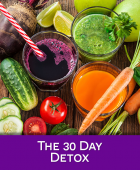Heal Your Thyroid Gland
The thyroid gland needs specific vitamins and minerals to function well. Research shows us that there are several key nutrients that are highly valuable for the thyroid gland.
Iodine is the most important trace element found in thyroid functioning. Without iodine, our thyroid does not have the basic building blocks it needs to make the necessary hormones to support all of the tissues in the body. Thyroxine (T4) and Triiodothyronine (T3) are the most essential, active, iodine-containing hormones in our body. In 2012, a CDC report showed that women of childbearing years in the United States, ages 20-39, had the lowest iodine levels of any other age group. This is something we can easily improve by eating more iodine-rich foods such as seaweed and sea vegetables. (See the Veggie Seaweed Wrap Recipe below,)
Selenium is vital to our thyroid in several ways. Selenium-containing enzymes protect the thyroid gland when we are under stress, working to flush out oxidative and chemical stress, and even social stress – which can cause reactions in our body. Selenium-based proteins help regulate hormone synthesis, converting T4 into the more accessible T3. These proteins and enzymes help regulate metabolism and also help maintain the right amount of thyroid hormones in the tissues and blood, as well as organs such as the liver, kidneys, and even the brain. Selenium also helps regulate and recycle our iodine stores.
Zinc, iron, and copper are trace metals that are vital to thyroid function. Low levels of zinc can cause T4, T3, and the thyroid stimulating hormone (TSH) to drop too low. Research shows that both hyperthyroidism (overactive thyroid) and hypothyroidism (under active thyroid), can sometimes create a zinc deficiency leading to lower thyroid hormones. Decreased levels of iron can result in decreased thyroid function as well. When combined with an iodine deficiency, iron must be replaced to repair the thyroid imbalance. Copper is needed to help produce TSH, and maintain T4 production. T4 helps cholesterol regulation, and some research even indicates copper deficiency may contribute to higher cholesterol levels and heart issues for people with hypothyroidism.










How about those of us that are allergic to I2? What do you suggest? I can’t even take vitamins with iodine in them?
As always, when I read an article like this there is never a recommendation of HOW MUCH of these minerals and enzymes we should be taking. Is the average amount in our multi-vitamin fine? Or should we be taking more? How much is too much? Thus, this article isn’t very helpful, unless I can look at my supplements and say, “wow, I’m not taking nearly enough selenium….”
where’s the recipe?